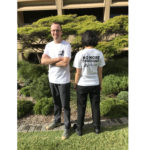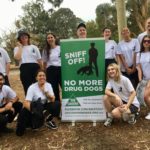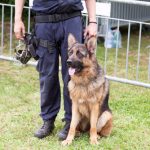Bring Berejiklian’s Strip Search Regime to an End

“Summer of Glove” posters have been springing up around Sydney’s CBD. They feature an image, depicting NSW premier Gladys Berejiklian pulling on some latex gloves in preparation, it would seem, for a rather invasive strip search she’s about to conduct.
Below the Liberal leader’s image, reads the line “Strip searches across Sydney”, which is a fairly accurate summing up of what’s been happening in this city of late. Indeed, throughout the state, strip searches have become routine, even though they’re supposed to be a measure of last resort.
Produced by art collective Wowser Nation, the posters also feature the government’s waratah logo behind bars, with authority attributed to the “NSW Police State”. And this sums up how many who’ve been searched, stripped, sniffed, and locked out perceive the direction this state is taking.
NSW Greens MLC David Shoebridge revealed in December 2018 that over the four years to June that year strip search use had increased by 47 percent. And over the last 12 months of that period, 5,483 individuals were ordered to disrobe, when only 37 percent actually possessed something illegal.
And it’s this escalating use of a procedure that can prove highly traumatic that’s led the NSW Greens to produce draft legislation that’s designed to seriously limit when and how NSW police officers can force a person to strip off in front of them, as well as when the use of drug dogs can be applied.
A law unto themselves
“This has got to plague proportions,” Mr Shoebridge made clear. “There is no question that the police are routinely abusing their strip search and personal search powers.”
“There were over 5,000 strip searches performed by police on people who were not under arrest, and there were thousands more on people who had been arrested and were in police custody,” the NSW Greens justice spokesperson told Sydney Criminal Lawyers.
Shoebridge is one of a number of vocal critics of the way NSW police are applying strip searches, which has included incidents of people being ordered to strip off on the side of the road, as well as the strip searching of Aboriginal kids as young as eleven, and the use of the technique to intimidate.
So strong was the levelling of complaints about strip search use to the Law Enforcement Conduct Commission (LECC) that it launched its own inquiry into the invasive practice, which resulted in exposing multiple incidents where teens were unlawfully strip searched at festivals.
And Shoebridge has noted the Berejiklian strip search posters doing the rounds. “It’s really powerful, because it’s capturing the mood on the ground,” he explained. “That’s how young people see their government – not there to help. They’re there to bail them up and seriously infringe their rights.”
Reining in those powers
It’s against this backdrop that the office of David Shoebridge last Friday released the initial draft version of the Law Enforcement (Powers and Responsibilities) Amendment (Drug Detection Dogs and Strip Searches) Bill 2020.
The legislation seeks to limit the circumstances when officers can conduct a strip search in the field to situations where there’s “an immediate and serious risk to the life or safety of any person unless the strip search is carried out”.
And this is a marked difference from the situation right now, which involves suspected illegal personal drug possession being the reason behind 91 percent of strip searches.
The bill also prevents police from searching children under the age of 16. At present, officers are able to strip search children as young as 10 if certain other measures are followed. And it’s been well documented that officers aren’t always following lawful procedures in these cases.
If passed in its current form, the bill would also prohibit certain practices that are currently being carried out in what might be called protocol grey areas. These include the ability to make people squat and cough while naked, and ordering them to lift or move their genitals, buttocks or breasts.
The Green’s draft legislation further makes amendments to sniffer dog operations. It would see the NSW police use of drug detection dogs in public places limited to situations where officers have already obtained a court issued warrant.
“We’ve put our draft bill out for public consultation” Shoebridge explained, adding that there’s a process for registering feedback and submissions online. “We want to hear from members of the community, civil libertarians and lawyers’ groups about our bill to make sure we’ve got it right.”
Mounting evidence
Although the rising number of strip searches being carried out by police had been noticed mid-last decade, the extent of how prevalent the use of this trauma-inducing procedure has become only really started to come to the fore in the second half of 2018.
However, despite these concerns, the list of search related issues only grew over 2019. Police began using screens at Central Station, so they could strip search commuters on their way home, while reports revealed the searches are at times being conducted without a required initial pat down.
And a Redfern Legal Centre commissioned UNSW police strip search report found a twentyfold increase in the use of these searches since 2006. And it recommended a complete overhaul of the protocols set out in the legislation, which is what the Greens bill aims to do.
Calls from high places
Deputy state coroner Harriet Grahame released her findings into the inquiry into the deaths of six patrons at NSW festivals last November. And in her report, she recommends that NSW police commissioner Mick Fuller limit the circumstances in which strip searches can be applied at events.
So as to “address the harm potentially caused” by strip searches when used for personal possession, Ms Grahame recommends that they’re only conducted if there’s a safety risk and in cases of drug supply, while she further suggests that the reasons for these searches be recorded on video.
And it’s in following this “powerful recommendation” that the NSW Greens has drafted the legislation proposing an overhaul of state strip search laws. And the bill remains open for consultation during the period prior to NSW parliament reconvening and Shoebridge introducing it.
“There is a strong sentiment amongst MPs to rein in strip searches in particular,” Mr Shoebridge concluded. “We remain hopeful that a majority of MPs have enough engagement with the community that they’ll come on board and support it.”







